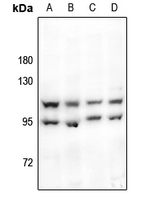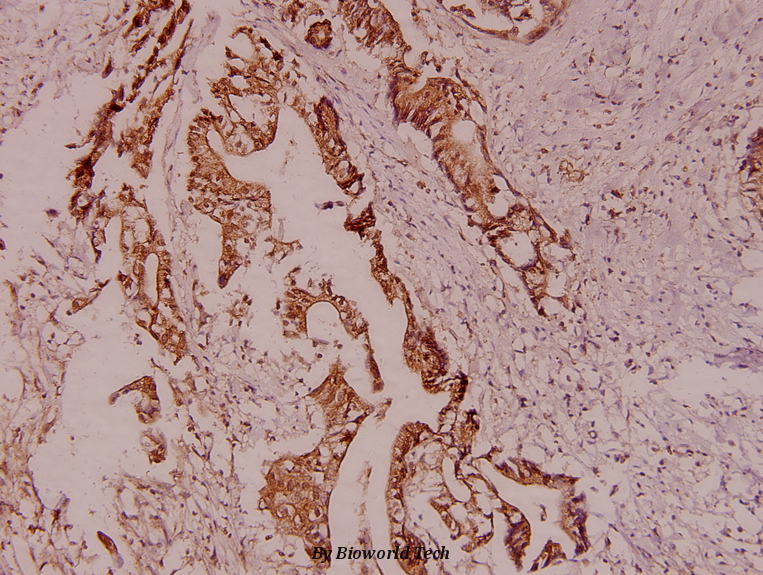Product Name :
HSL (P548) polyclonal antibody Background :
HSL (hormone-sensitive lipase), a cytosolic neutral lipase regulated by reversible phosphorylation, catalyzes the rate limiting step in triglyceride lipolysis. HSL hydrolyzes stored triglycerides to free fatty acids in adipose and heart tissues. In organs with steroidogenic tissues, such as small intestine, HSL converts cholesteryl esters to free cholesterol for steroid hormone production. HSL is highly expressed in jejunal enterocytes and in the mucosa of the small intestine. Two major isoforms of HSL have been described resulting from the use of alternative translational start codons. The short isoform is expressed in adipose tissue while the long isoform is expressed in steroidogenic tissues such as testis. The long isoform, often referred to as testicular HSL contains an N-terminus of approximately 300 amino acids not present in the short isoform of HSL. Product :
Rabbit IgG, 1mg/ml in PBS with 0.02% sodium azide, 50% glycerol, pH7.2 Storage&Stability :
Store at 4°C short term. Aliquot and store at -20°C long term. Avoid freeze-thaw cycles. Specificity :
HSL (P548) polyclonal antibody detects endogenous levels of HSL protein. Immunogen :
Synthetic peptide, corresponding to amino acids 520-570 of Human HSL. Conjugate :
Unconjugated Modification :
Unmodification
HSL (P548) polyclonal antibody Background :
HSL (hormone-sensitive lipase), a cytosolic neutral lipase regulated by reversible phosphorylation, catalyzes the rate limiting step in triglyceride lipolysis. HSL hydrolyzes stored triglycerides to free fatty acids in adipose and heart tissues. In organs with steroidogenic tissues, such as small intestine, HSL converts cholesteryl esters to free cholesterol for steroid hormone production. HSL is highly expressed in jejunal enterocytes and in the mucosa of the small intestine. Two major isoforms of HSL have been described resulting from the use of alternative translational start codons. The short isoform is expressed in adipose tissue while the long isoform is expressed in steroidogenic tissues such as testis. The long isoform, often referred to as testicular HSL contains an N-terminus of approximately 300 amino acids not present in the short isoform of HSL. Product :
Rabbit IgG, 1mg/ml in PBS with 0.02% sodium azide, 50% glycerol, pH7.2 Storage&Stability :
Store at 4°C short term. Aliquot and store at -20°C long term. Avoid freeze-thaw cycles. Specificity :
HSL (P548) polyclonal antibody detects endogenous levels of HSL protein. Immunogen :
Synthetic peptide, corresponding to amino acids 520-570 of Human HSL. Conjugate :
Unconjugated Modification :
Unmodification
-
 Western blot (WB) analysis of HSL (P548) polyclonal antibody at 1:500 dilution Lane1:HEK293T whole cell lysate Lane2:Raw264.7 whole cell lysate Lane3:PC12 whole cell lysate
Western blot (WB) analysis of HSL (P548) polyclonal antibody at 1:500 dilution Lane1:HEK293T whole cell lysate Lane2:Raw264.7 whole cell lysate Lane3:PC12 whole cell lysate -
 Immunohistochemistry (IHC) analyzes of HSL (P548) pAb in paraffin-embedded human colorectal cancer carcinoma tissue at 1:100.
Immunohistochemistry (IHC) analyzes of HSL (P548) pAb in paraffin-embedded human colorectal cancer carcinoma tissue at 1:100.
The local corticotropin-releasing hormone receptor 2 signalling pathway partly mediates hypoxia-induced increases in lipolysis via the cAMP–protein kinase A signalling pathway in white adipose tissue
PMCID: Pubmed No.:24859650
Mark4 promotes adipogenesis and triggers apoptosis in 3T3-L1 adipocytes by activating JNK1 and inhibiting p38MAPK pathways.
PMCID: Pubmed No.:24989893
αMSH promotes preadipocyte proliferation by alleviating ER stress-induced leptin resistance and by activating Notch1 signal in mice
PMCID: Pubmed No.:27717825
miR-103 promotes 3T3-L1 cell adipogenesis through AKT/mTOR signal pathway with its target being MEF2D
PMCID: Pubmed No.:25400071
Effects of liraglutide on lipolysis and the AC3/PKA/HSL pathway
PMCID: Pubmed No.:31564937
Bioworld Biotech only provide peptides for our antibodies and do not provide additional peptide customization services.
Price/Size :
USD 368/1mg/vial
Tips:
For phospho antibody, we provide phospho peptide(0.5mg) and non-phospho peptide(0.5mg).Describe :
Blocking peptides are peptides that bind specifically to the target antibody and block antibody binding. These peptide usually contains the epitope recognized by the antibody. Antibodies bound to the blocking peptide no longer bind to the epitope on the target protein. This mechanism is useful when non-specific binding is an issue, for example, in Western blotting (WB) and Immunohistochemistry (IHC). By comparing the staining from the blocked antibody versus the antibody alone, one can see which staining is specific; Specific binding will be absent from the western blot or IHC performed with the neutralized antibody.Formula:
Synthetic peptide was lyophilized with 100% acetonitrile and is supplied as a powder. Reconstitute with 0.1 ml DI water for a final concentration of 10 mg/ml.The purity is >90%,tested by HPLC and MS.
Storage:
The freeze-dried powder is more stable. For short time at 2-8°C. For long term storage store at -20°C.
Note :
This product is for research use only (RUO only). Not for use in diagnostic or therapeutic procedures.
 HSL (P548) polyclonal antibody
HSL (P548) polyclonal antibody  Datasheet
Datasheet COA
COA MSDS
MSDS SHIP
SHIP